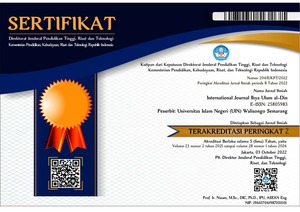Analysis of Polygamy Practices in Batak Muslim Community in South Rantau Based on Law No. 16 of 2019 about Marriage and Islamic Law
DOI:
https://doi.org/10.21580/ihya.24.1.8894Keywords:
Polygamy, Batak Muslim Community, Law, Islamic LawAbstract
The Batak Muslim community in South Rantau considers marriage as a means to produce offspring to continue the male kinship side, in this case, the clan. So, if a marriage does not give birth to a son, the clan lineage is considered broken and cannot continue the clan lineage and inheritance. And also, if the marriage is still to be maintained, a husband can perform presidia-duo (two wives). The practice of polygamy in the South Rantau sub-district is carried out due to biological and economic conditions. The people who practice polygamy a lot are the Batak Muslim community. This situation creates a dilemma between obedience to religion and adherence to the law. On religious observance, they rely on the practice of polygamy based on understanding the QS. An-Nisa: 3. Meanwhile, compliance with the law is based on the Law of the Republic of Indonesia Number 16 of 2019 concerning marriage amendments to the Law of the Republic of Indonesia Number 1 of 1974. From here, this study discusses the practice of polygamy in the South Batak Rantau Muslim community, with reference to the provisions of Islamic law and Undang-undang. This research is field research by conducting observations, interviews, and documentation in the District of South Rantau. From here, the formulation of the problem to be answered in this study is how the practice of polygamy carried out by the Muslim community is understood through Law No. 16 of 2019 and Islamic Law.
Downloads
References
Abdurahman. 2007. Compilation of Islamic Law in Indonesia. Jakarta: Pressindo Academy.
Al-Jaziri, Abdurahman. 1986. The book 'ala Mazahib al-Arba'ah. Beirut Lebanon Dar Ihya Al-Turas Al-Rabi
Aini, Nurul. 2017. “Perlindungan Hak Anak Dalam Perkawinan Poligami Di Indonesia.” Journal de Jure 9(2): 73–87.
Burhanudin, 2019, Fazlur Rahman’s Perspective on Polygamy, As-Sabiqun, Vol. 1, No. 2.
Engineer, Asghar Ali. 2003. Liberation Theology. Yogyakarta: LKiS.
Harahap, Yahya. 1975. National Marriage Law. Medan: Zahi Trading Co Medan.
Machali, Imam. 2015. “Poligami Dalam Perdebatan Teks Dan Konteks: Melacak Jejak Argumentasi Poligami Dalam Teks Suci.” PALASTREN Jurnal Studi Gender 8(1): 35–56.
Ministry of Religion RI. 1995. The Qur'an and its Translation. Semarang: CV. Toha Putra, 1995.
Muhammad,Bushar. 2004. Basics of Customary Law. Jakarta: PT. Pradnya Pratama.
Nasution, Khairuddin. 1999. Riba and Polygamy: A Study of Muhammad Abduh .'s Thoughts. Yogyakarta: Pustaka Pelajar.
Pagar. 2010. Association of Legislations for Religious Courts in Indonesia. Medan: Puerdana Publising.
Ramulyo, Moh. Idrus. 1996. Islamic Marriage Law. Jakarta: Bumi Aksara.
Ridwan, Muhammad Saleh. 2010. “Polygamy and the Marriage Law in Indonesia”, Al-Risalah, Volume 10 Number 2.
Saebeni, Beni Ahmad. 2009. Munakahat Jurisprudence. Bandung: Faithful Library.
Salamah, Umi, 2019, The Polemic of Polygamy in Islamic Law and a Review of Human Rights, Dimas, Vol. 1, No. 1.
Santoso, Dri, 2021, Polygamy In Law Number 1 Year 1974 and Islamic Law Perspective Maqashid Al-Sharia, Al-Syakhsyyah, Vol. 3, No. 2.
Soekanto,Soerjono. 2010. Introduction to Legal Research. Jakarta: UI Press.
Sunaryo, Agus, 2010, Polygamy in Indonesia (a Sociological Normative Analysis), YinYang, Vol. 5, No. 1.
Syahrum dan Salim. 2012. Qualitative Research Methodology. Bandung: Cita Librarian Media.
Thalib, Sayuti. 1986. Indonesian Family Judge: Berlaku bagi Umat Islam. Jakarta: UI Pers.
The results of observations about the practice of community diversity in South Rantau District,13 Juni 2020 S/d 19 Juli 2020.
Yusefri, 2015, Legal Poligamus According to Siti Musdah Mulia, Mizan; Jurnal Ilmu Syariah, FAI Universitas Ibn Khaldun (UIKA) Bogor, Vol. 3, No. 2.
Vergouwen, J.C. 2004. Toba Society and Customary Law. Yogyakarta: LKiS.
Downloads
Published
How to Cite
Issue
Section
License
By submitting an article to the journal, the author(s) agree to transfer the published article's copyright to the journal, which will act as the publisher. This means the journal will have the right to publish the article in various forms, including reprints. The journal will maintain the publishing rights to the published articles.
This work is licensed under Creative Commons Attribution-ShareAlike 4.0 International License.
In line with the license, authors and third parties (readers, researchers, and others) are allowed to share and adapt the material. In addition, the material must be given appropriate credit, provided with a link to the license, and indicated if changes were made. If authors remix, transform or build upon the material, authors must distribute their contributions under the same license as the original.



